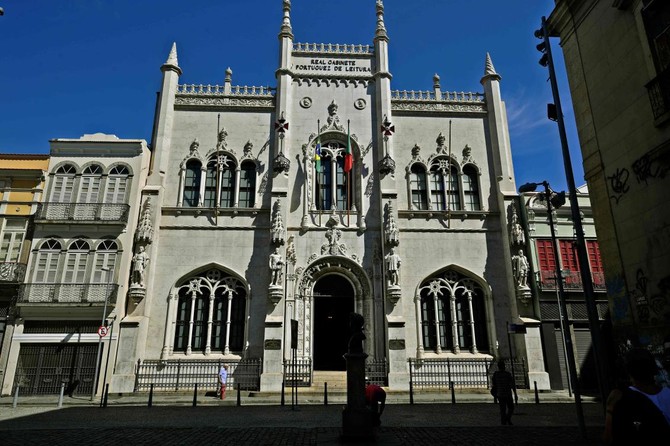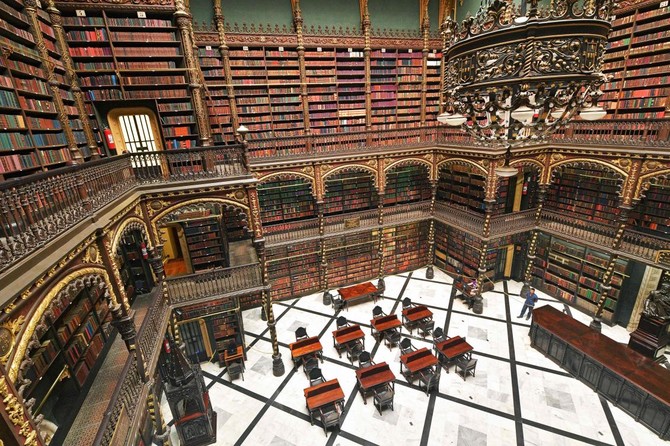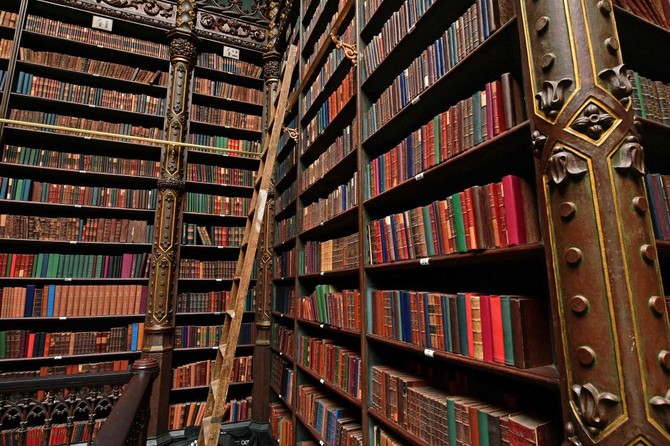RIO DE JANEIRO, Brazil: From the outside, it looks like another historic edifice in Rio’s rundown city center.
Inside, however, is a multi-tiered library so spectacular, so ornate, that stunned visitors feel like they’ve walked into a movie fantasy set.
“In ‘Harry Potter’ we’ve seen libraries like this!” exclaimed Didier Margouet, a 57-year-old French tourist, looking around at the shelves of leather bound books climbing the walls under an octagonal skylight of red, white and blue stained glass.
“Yes, like in the movies,” agreed his partner, Laeticia Rau, 50.
The Royal Portuguese Reading Room — the Real Gabinete Portugues de Leitura in Portuguese — was built in the late 19th century under the stewardship of an association of Portuguese migrants that still cares for the institution.
Its Gothic-Renaissance architecture and plethora of carvings, tiles and sculptures celebrate the glory of the Portuguese discoveries era in the 15th and 16th centuries.
Holding some 350,000 books, some of them very rare, the library today is more a tourist attraction and selfie backdrop than a reading room, though for a few it remains an indispensable haven for the largest collection of Portuguese-language books outside of Portugal.
One such loyal reader is Carlos Francisco Moura, an 86-year-old who writes about the history of Portugal.
He arrived in Brazil from Portugal aged four with his parents, and from childhood became a regular visitor. Now retired from his profession as architect, Moura spends his time leafing through the tomes, copying information for his own books.
“This is the alma mater of the Portuguese in Brazil — the reading room is that, and a lot more,” Moura told AFP, sitting at one of the dark wooden desks.
The library is a valuable resource, he explained, because since the 1930s it has become a repository of every book published in Portugal.
Brazil’s historic connection with its former colonial ruler runs deep. In 1808, Portugal’s king and his government made Rio de Janeiro the capital of the Portuguese Empire.
Later, the king’s son declared independence and made himself the emperor of Brazil. Portuguese remained the country’s principal language, and with it a two-way literary culture between the two countries. Today, the Portuguese and Brazilian flags both fly on the library’s exterior.
Orlando Inacio, 67, manages the place. He too came from Portugal as a boy — and has never returned.
“It’s a real point of pride to know that this library created by Portuguese is one of the most beautiful in the world,” he said.
Giving a bit of its history, he traced the library’s roots back to an association of Portuguese immigrants started in 1837.
“The aim was to help the immigrants, who in general were little educated, to improve their knowledge, their education,” he said.
The association continues to fund the library, its members paying a monthly amount that helps cover part of its overheads. The rest of the income comes from other buildings owned by the association that are rented out.
Inacio acknowledged that the Internet has brought changes, reducing the need for researchers and bookworms to frequent the place except for consulting rare books that are otherwise unavailable.
But his delight in his everyday office is evident. He is, after all, custodian of a temple of literature steeped in history, connecting Portugal and Brazil in a bond of language.
Historic library weaves ‘Harry Potter’-style tourist magic in Rio
Historic library weaves ‘Harry Potter’-style tourist magic in Rio

- The Royal Portuguese Reading Room was built in the late 19th century
- The library is a valuable resource because since the 1930s it has become a repository of every book published in Portugal
Saudi stars shine at Ivana Chubbuck’s Riyadh workshop

DUBAI: Saudi actresses Sumaya Rida, Adwa Bader and Mila Al-Zahrani participated in a workshop hosted by the California-based drama school Ivana Chubbuck Studio in Riyadh.
The workshop is part of the Ministry of Culture and the Film Commission’s Filmmakers Program, which runs until the end of January.
Rida, known for her breakout television roles in “Another Planet” and “Boxing Girls” as well as her big-screen appearances in “Junoon” and “Roll’em” — among the first films to premiere in the Kingdom after cinemas reopened — took to Instagram to share behind-the-scenes moments from the workshop with her colleagues.

She also shared a clip of herself with Zahrani and later posted an Instagram Story featuring both of them, captioning it, “My scene partner.”
Ivana Chubbuck, founder and director of the studio, is a US acting coach and creator of the widely adopted Chubbuck Technique, known for its role in Oscar-winning and nominated performances.
She heads the drama school in Los Angeles and conducts acting workshops worldwide.
Chubbuck has worked with renowned actors such as Charlize Theron, Brad Pitt, Sylvester Stallone, Terrence Howard, James Franco, Jake Gyllenhaal, Elisabeth Shue, Catherine Keener, Halle Berry, and Jared Leto, among others.
She is also the author of the best-selling book “The Power of the Actor,” published by Penguin Books’ Gotham division, which has been translated into 20 languages.
Chubbuck’s Riyadh workshop was also attended by Saudi actor and comedian Fahad Albutairi, who shared a carousel of images from the event on Instagram. Among the pictures was a signed note from Chubbuck that read: “Fahad, you are so talented and (I) look forward to continuing our journey together.”
The attendees received a certificate of participation after the workshop, which Albutairi also posted on his Instagram.
The Filmmakers Program collaborates with several international film universities and institutes to provide training opportunities and workshops for both amateur and professional filmmakers in the Kingdom.
Review: Palestinian poet Mosab Abu Toha writes against erasure, destruction

JEDDAH: “Every child in Gaza is me,” writes Palestinian poet Mosab Abu Toha in the creed-like opening of “Forest of Noise,” setting the tone for the poems to come and establishing his profound connection to his people and Palestine.
The poems within the slim but impactful volume by the Palestine Book Award-winning poet blend personal narratives with the broader documentation of life under Israeli occupation, siege, and bombardment in Gaza.
Released amidst one of the most turbulent periods in recent Palestinian history, Abu Toha uses the art form to not only capture personal memory, but to document Israel’s atrocities committed against Palestinians and the resilience of the people living in a continuous state of emergency.
Written in clear, simple language that often evokes visceral, painful imagery, his poetry oscillates between moments of loss, destruction, and survival, and glimpses of peace that seem fantastical in their rarity.
In “Palestinian Village,” Abu Toha imagines a peaceful scene “where a canary never tires of singing” that feels like a distant memory or a dream in stark contrast to the harrowing reality on the ground. The poem, like others in the collection, is a reminder of the cultural and natural heritage that Palestinians are fighting to preserve amid what Amnesty International, as well as some regional states, have termed a genocide.
In “On Your Knees” he powerfully uses repetition of the line “on your knees!” to document the humiliating and horrifying experience of being abducted by Israeli forces as he attempted to cross the Rafah border with his family in November 2023.
Abu Toha resists physical subjugation with poetry as a form of resistance and memory — asserting the Palestinian self and narrative and highlighting the power of art to fight back against erasure.
In “After Allen Ginsberg,” the Palestinian poet draws from the American’s iconic work “Howl,” writing:
“I saw the best brains of my generation
protruding from their slashed heads.”
By adopting Ginsberg's confrontational style, Abu Toha’s unrestrained voice laments and protests Israel's ongoing assault that has claimed the lives of thousands of children, women, and men.
The poet’s unwavering voice in “Forest of Noise” challenges readers to see Gaza not as a distant conflict but as a human tragedy that demands attention.
French Algerian actress Sofia Boutella begins year with ‘SAS Rogue Heroes’

DUBAI: French Algerian actress Sofia Boutella started the new year on a high note with the premiere of season two of the BBC series “SAS Rogue Heroes.”
“Happy New … SAS season 2 is out … and Happy New Year,” she wrote on Instagram this week, sharing on-set pictures of herself and her co-stars from the military drama, which chronicles the exploits of the British Army’s special forces unit.
Series two, created by Steven Knight (“Peaky Blinders”), picks up with British troops in the spring of 1943 during World War II.
Returning for the sequel are actors Jack O’Connell, Connor Swindells, Dominic West and Sofia Boutella, who reprises her role as French intelligence agent Eve Mansour.
Commissioned by the BBC, the show is based on Ben Macintyre’s best-selling book of the same name, with season two having been directed by Stephen Woolfenden.
Boutella most recently starred “The Killer’s Game,” which hit cinemas in September, and Netflix’s “Rebel Moon — Part 2: The Scargiver.”
In the sci-fi adventure — a sequel to last year’s “Rebel Moon — Part One: A Child of Fire” — a peaceful colony on the edge of a galaxy finds itself threatened by the armies of a tyrannical ruling force.
Kora, played by Boutella, has assembled a small band of warriors — outsiders, insurgents, peasants and orphans of war from different worlds.
Boutella drew on her history as an immigrant. She grew up in Algeria during its civil war and later moved to France and found herself navigating the complexities of adapting to a different culture.
“Having left Algeria young, when I go back there I don’t feel like I belong to Algeria. And then, in France, I don’t feel like I belong to France because I didn’t grow up there,” she told Arab News in a previous interview.
Boutella has learned to embrace her rootlessness, though. “I feel like I belong to this planet. I have the freedom to travel wherever I want, without any limitation,” she said. “But sometimes, I miss the proximity and attachment that people have to their country.”
Kora was not Algiers-born Boutella’s first role as a sword-wielding extraterrestrial. The actress, who at the age of 10 fled to Paris with her family during the Algerian civil war, is known for her breakout performance in the Oscar-nominated film, “Star Trek Beyond,” in which she portrayed the fierce alien warrior, Jaylah.
Iran artist’s vision for culture hub enlivens rustic district

- Arabesque patterns and relief faces carved with intricate details and painted in vivid hues of greens, pinks, blues, and purples now adorn the walls
SHIRAZ, Iran: In the winding alleys of southern Iran, artist Adel Yazdi has taken it upon himself to turn his rustic old neighborhood into a cultural and tourist hub through vibrant paintings and carved relief faces.
Narenjestan, a neighborhood characterized by crumbling, uninhabited houses, is nestled in Shiraz, a southern city celebrated for its historic architecture, lush gardens, and revered poets.
“Most of the dilapidated walls in old Shiraz have no historical value,” said Yazdi, a bushy-bearded, bespectacled 40-year-old artist who has dedicated himself to revitalizing Narenjestan.
Over the years, Yazdi has turned the long-neglected neighborhood walls into a vivid visual tapestry “telling the stories of the people living here,” he said.
Arabesque patterns and relief faces carved with intricate details and painted in vivid hues of greens, pinks, blues, and purples now adorn the walls.
With its striking designs and bright colors, Yazdi’s art can be reminiscent of Surrealism. It often comes across as surprising, showcasing a different side of Iran’s artistic heritage that goes beyond the conventional focus on traditional architecture.
The artwork includes the face of Scheherazade, Yazdi said, referencing the legendary storyteller from the “One Thousand and One Nights” collection of folktales.
Yazdi’s work stands out in Shiraz, where graffiti and murals are rare, and it has become a social media sensation and a tourist attraction.
Yazdi said he drew inspiration from the Pompidou Center in Paris, a cultural hub that transformed the heart of the French capital in the 1970s. He hopes his efforts can turn Shiraz’s alleyways into a more vibrant cultural center.
At his residence, visitors are particularly drawn to what Yazdi calls “the Finger Room.”
Inside, he installed around 14,000 finger sculptures on the ceiling, all pointing downward.
“The room is inspired by the legend of an angel that counts raindrops with thousands of fingers,” he said, referring to a religious fable.
“These fingers constantly remind us that the present moment is precious and that we must seize it.”
REVIEW: ‘Squid Game’ enters a holding pattern

- Second season of the hit Netflix show feels tentative, ahead of its upcoming finale
LONDON: The success of “Squid Game” in 2021 made a second season an inevitability, rather than a mere possibility proffered by a hopeful epilogue scene. But because this smash-hit show came out of South Korea, there was also an optimistic air to its steadily approaching release — could this addictively bleak dystopian thriller sidestep a lot of the Hollywood pitfalls and deliver a second season that was at least the equal of the first?
Although it’s a sidestep of its own, the answer is… we’re not sure yet. And that’s because, although it’s billed as season two, these seven new episodes were shot back-to-back with season three (coming in 2025 and confirmed to be the last). So what you’re essentially getting here is the setup for the big finale still to come. That perhaps explains why, though the first season dropped viewers into the murderous titular competition pretty quickly, the actual ‘game’ of the second season of “Squid Game” doesn’t start until midway through the third episode. Before that, we’re reintroduced to main protagonist Seong Gi-hun (Lee Jung-Jae, still far and away the best thing about the show). Having won the first season’s brutal series of children’s games (for which the losers’ penalty is death), Gi-hun is spending his reward money trying to bring down the organizers of the competition, teaming up with season one detective Hwang Jun-ho (Wi Ha-joon) in an attempt to topple the shady cartel that is pressganging cash-strapped Koreans into murdering each other for money. When his plan to catch the game’s Front Man fails, he instead joins the latest intake, intent on helping the contestants escape with their lives.
It’s an odd choice to spend so long building up to the competition — and even dallying on whether it can be proved it even exists — when that’s what viewers are here for. Once the games get going, “Squid Game” is as breathless and shocking as ever, and with a new cast of characters, there are fresh backstories to mine and some pretty pointed social commentary on greed, capitalism and social care (Korean commentators have suggested that the subtitles miss a few of the nuances of the script, which may be why some of the satire seems a little on the nose). Perhaps acknowledging what audiences will remember, there’s also a few decent twists that deserve to remain a surprise.
But while season two of “Squid Game” is still great television, there’s no small amount of bloat here — and a sense of treading water for the final round still to come.
















